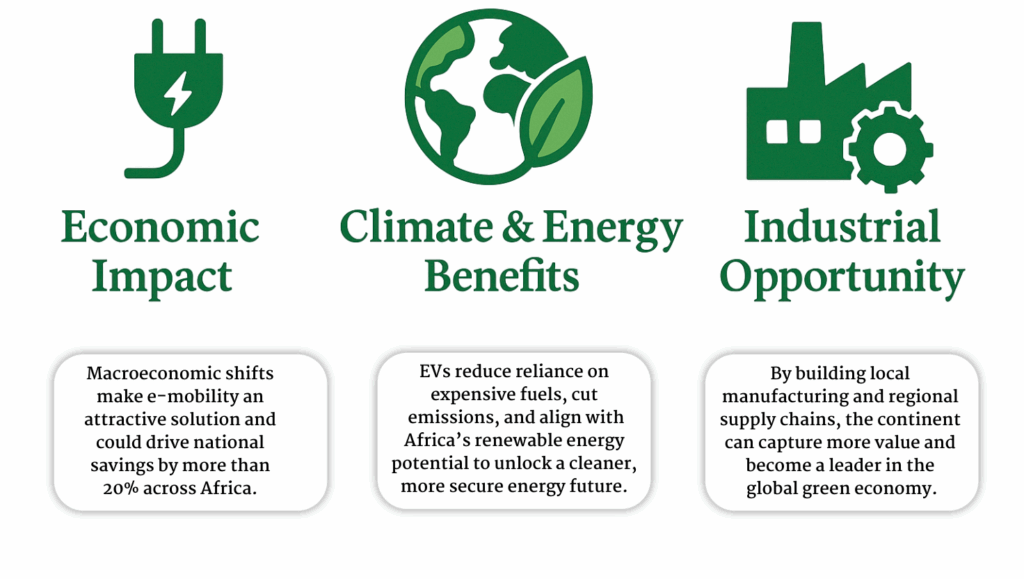As clean energy solutions gain momentum worldwide, electric vehicles (EVs) have emerged as a promising alternative to tackle climate change, energy insecurity, and rising transport costs. With EVs projected to make up 80% of global vehicle sales by 2050, Africa is gearing up accordingly not just to adopt but to lead a more sustainable mobility revolution.
Why E-Mobility Makes Sense for Africa
Several trends and macroeconomic shifts make e-mobility an attractive solution for the continent: rising fuel costs, the economic burden of internal combustion engine (ICE) vehicles, and greater awareness of climate risks. Governments, investors, and development partners are also increasingly backing the transition.
The economic benefits are just as compelling. EVs offer lower lifetime operating costs, and widespread adoption could drive national savings, up to $10 billion in Nigeria by 2040, according to Clean Technology Hub. Beyond savings, e-mobility can spur job creation in manufacturing, assembly, and services, which supports scalable, efficient transport solutions essential for Africa’s rapidly growing population.

Challenges to Solve, Opportunities to Seize
Despite these benefits, challenges remain – most notably financing gaps, infrastructure deficits such as unreliable power supply, lack of widespread charging stations, and limited technical capacity, all of which are still in development.
These challenges are not insurmountable; in fact, they create new opportunities for innovation and growth. Across Africa, we are seeing the rise of flexible financing models such as pay-as-you-go and lease-to-own options, allowing users to adopt EVs without the burden of high upfront costs. Strategic partnerships between e-mobility companies, development finance institutions (DFIs), banks, and climate-focused investors are also helping to unlock capital to scale infrastructure and vehicle deployment.
Momentum Across the Continent
Policy and private sector actions are accelerating progress. Countries such as Kenya, Nigeria, Rwanda, Egypt, Morocco, and South Africa are showing great near-term potential and creating favorable conditions for e-mobility growth.
- Nigeria targets 13 million EVs by 2050 as part of its Energy Transition Plan to make up 60% of the total vehicle market, and is welcoming new manufacturing partnerships such as China’s entry into the market to ramp up infrastructure.
- Ethiopia announced last year to ban the import of ICE vehicles altogether, leveraging its hydroelectric capacity.
- Kenya is seeing rapid EV adoption through firms like Spiro, BasiGo, Roam, and Ampersand. Also, government reforms such as a reduced excise duty from 20% to 10% and VAT exemptions for electric vehicles are increasing adoption rates. ERPA notes a 160% increase in energy consumption in the electric mobility sector over the last two years.
A Bigger Opportunity to Building a Sustainable Industry
Beyond vehicle deployment, e-mobility offers Africa a chance to strengthen its position in the global green economy. The continent holds key raw materials for battery production, and local manufacturing could reduce costs, shorten supply chains, and boost industrial capacity.
Regional collaboration could unlock integrated value chains, spanning raw materials, assembly, and logistics. This would allow countries to specialize and reduce import dependency, while keeping more economic value within the continent.
For manufacturers, Africa offers lower logistics costs and proximity to fast-growing markets. With the right partnerships and coordinated approaches, the continent is well positioned to not only build a sustainable industry but a thriving one.
Nithio’s Role in Accelerating the Transition
At Nithio, we believe e-mobility is central to a climate-resilient and economically inclusive future. That is why we have expanded our investment mandate to support one of the most dynamic and impactful sectors in Africa’s clean energy transition.
We are actively deploying capital to e-mobility companies across the continent, providing asset and infrastructure financing tailored to their unique needs. Our view of success in the space is providing companies with financing to deploy tens of thousands of vehicles and supporting them in unlocking more capital from other financiers by leveraging our AI-powered credit risk engine to de-risk these investments and enable EV companies to scale with confidence.
Speak with our Investment team or Partner with Nithio to finance e-mobility and clean energy solutions here.

Recent Comments